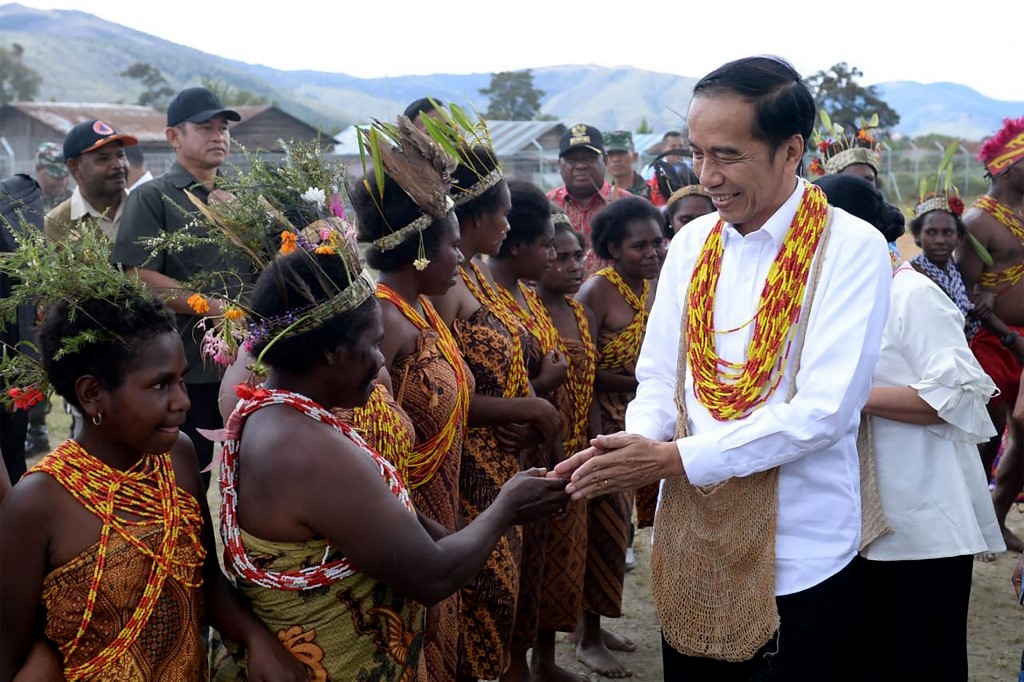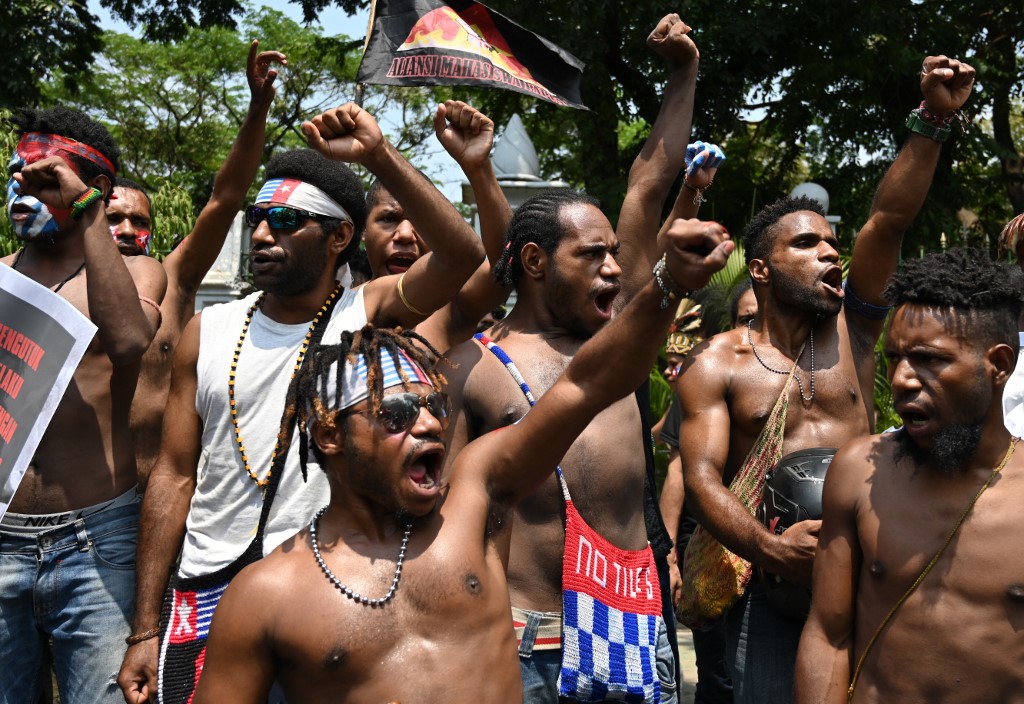Last week, on July 15, the Indonesian Government renewed and amended the Special Autonomy Law for Papua, the framework for Jakarta-Papua relations over the past 20 years which was set to expire in November.
Boosting funds directed towards the region, the move is in line with President Joko Widodo’s (Jokowi) development ambitions for Papua. But the move was met with protests from pro-independence activists who warn it will only increase the central government’s grip over the resource-rich region while ignoring local concerns. The United Liberation Movement for West Papua (ULMWP) called it an extension of “racist colonial rule”.
This month seven years ago Jokowi won his first election. The first president to not have a military background or belong to a prominent family, he raised hopes of a new Indonesia among his supporters. Among the multitude of domestic issues, Papua, where he launched his first presidential campaign, has been among his top priorities.
Indonesia’s most underdeveloped region, Jokowi has targeted the region with a ‘prosperity-based approach’ of infrastructure and economic development. During his presidency, Jokowi has also made a concerted diplomatic push, visiting Papua at least 13 times – more than any other president. From Papua, Jokowi has tried to show his wider commitment to promoting development and the welfare of people in rural areas, where the majority of the Indonesian population still resides.
However, despite Jokowi’s development drive, questions linger over the ecological impact of this push, while critics point to the continued militarisation of the region and the government’s sluggishness in investigating human rights violations.
Under Jokowi, the region’s campaign for self-determination has continued and grown, both in the international and domestic arena. In December 2014, only two months after Jokowi took office, Papuan nationalists in exile formed the ULMWP. Chaired by Benny Wenda, it has become the main political wing for the international advocacy campaign. In the domestic arena, demands for an independence referendum have only grown louder in the wake of 2019 riots across Papua, triggered by the racial abuse of Papuan students in Surabaya.
Growing strain has continued to show in recent months too, with the government labelling Papuan separatists as terrorists in April after a series of killings. At the halfway point of his second term, it’s clear that Jokowi’s Papua legacy, despite his best efforts, looks set to be mixed at best.
Development, but at what cost?
At his inauguration speech in October 2014, President Jokowi stressed the importance of working hard to solve the nation’s problems. He raised the simple, albeit effective, slogan “work-work-work” and named his first cabinet “the working cabinet”.
Among the most prominent plans for this vision is the construction of massive infrastructure projects throughout Indonesia. In Papua, the Indonesian government has built airports, seaports, bridges, fiber optic telecommunications networks, power plants and the mega-project Trans Papua road – a 4,330 km roadwork to connect major cities, from Sorong in West Papua to Merauke in Southern Papua.
The government has also implemented ‘One Fuel Price Policy’, a populist policy to reduce fuel price disparity in the interests of “social justice”. This has been effective in remote areas of Papua, which can see fuel prices reach up to five times higher than other areas. In funding these projects and policies, during his first term (2014-2019) and half way through his second term (2019-2021), Jokowi’s administration has transferred some 800 trillion Indonesian rupiah, the equivalent of $55 billion, in total to Papua.
Another prominent feature of Papuan development during Jokowi’s administration has been the Village Fund scheme, or Dana Desa, addressing Indonesia’s wide rural-urban development gap. For Papua, this policy provides a further source of funds on top of the controversial Special Autonomy Law. The village fund transferred to Papua hit 4.28 trillion Indonesian rupiah in 2018, a sharp increase from 1.43 trillion in 2015 – the early years of Jokowi’s first term.
But while Jokowi’s government has made progress in terms of development, the region still lags behind in the Human Development Index (HDI), which measures key metrics of human development.
In 2014, when Jokowi first elected, Papua’s HDI was 56.75, far below the national average of 68.9. In 2020, when the HDI national average was 71.94, Papua’s remained below the national average with 65.09. That being said, while the two Papuan provinces remain the lowest nationally, the Indonesian National Statistic Bureau noted in its 2020 report that West Papua Province specifically achieved the highest HDI improvement nationwide.

While Jokowi’s characteristic development drive has been vast, it has not come without consequences in Papua, with a harmful byproduct of this being a growth in environmental degradation.
Papua has long suffered from deforestation related to the expansion of the palm oil industry, and this has only accelerated under Jokowi. In 2014, there were only 21 palm oil plantations operating in Papua, but by 2017, the number of oil palm companies holding government permits soared to 114. Consequently, massive land clearing has occurred in various districts in Papua – such as Jayapura, Sarmi, Keerom, Waropen, Nabire, Mimika, Asmat, Boven Digoel, and Merauke.
Apart from the rapid expansion of oil palm plantations, massive forest clearing has also taken place in Papua as a result of the government’s Food Estate programme. Aiming to convert 1.2 million hectares of forest into rice fields, it was planned under former president Susilo Bambang Yudhoyono, but implemented and expanded since 2015 under Jokowi.
In addition to environmental damage, the oil palm industry and Food Estate programme have triggered social problems, particularly related to the local communities who depend on the forest for their livelihoods. There are many stories of how deforestation in eastern Merauke in Papua, for example, has changed land ownership from indigenous peoples to other parties, or confiscated land with official documents issued by the government.
Unresolved human rights issues
But perhaps the most contested area of Jokowi’s legacy in Papua remains in terms of addressing rights abuses.
In the early years of his presidency, in the crowded and often corrupt field of Indonesian politics, Jokowi seemed to provide some fresh air for human rights issues. In front of thousands of Papuan during a Christmas celebration in Jayapura in December 2014, Jokowi stated his commitment to addressing decades of unresolved rights abuse cases in the region.
The speech was monumental as it was delivered only days after military personnel shot dead five high school students during a peaceful protest in Paniai District of Papua, offering hope for justice in a region that long suffered from violations.
In 2015, he also granted clemency to five Papuan political prisoners detained for treason, stating that there would be subsequent efforts for other political prisoners in the region. Further, during his visit to Merauke in May 2015, the president pledged to allow foreign journalists to visit Papua.
All of these moves in Jokowi’s first presidential term were regarded as strategic steps to build a fresh relationship between Jakarta and Papua. However, far from a peaceful dialogue approach that is often advocated for, Jokowi’s presidency has seen security forces continue to take the dominant role in coping with problems in Papua.
This is evidence of deteriorating relations between Jakarta and Papua, made particularly poignant in an environment in which investigations into human rights abuses have seen little progress
Following a shooting incident in Nduga in December 2018, that killed 24 construction workers, troops were sent in to pursue those suspected of perpetrating the violence. In August 2019, an incident spurred by racism directed towards Papuan students in Surabaya resulted in 6,000 troops being sent in to stem riots. Some 53 people, both Papuan and from other parts of the country, were killed, with authorities also shutting down the internet. These events led to renewed calls for an independence referendum by the ULMWP.
Likewise, a large number of troops were deployed to Intan Jaya District in September last year after a series of shootings that killed two members of Indonesian military (TNI) and civilians, including a priest. Later on, the fact finding mission formed by the government revealed that one or more TNI members were involved in the shooting of the priest in a sweeping operation responding to the shooting of a TNI member the day before.
Most recently, in April, after a series of atrocities in the Papuan Highlands – including the killing of two school teachers, the burning of schools, and the killing of the Head of Papua Regional Intelligence Agency (Kabinda) Brig. Gen. Putu Danny – the government declared Papuan separatist groups as terrorists. This move was followed by a large-scale hunt for Papuan armed groups by the security forces as Jokowi stressed: “There is no place for armed criminal groups in Papua or in all corners of Indonesia”.
All this is evidence of deteriorating relations between Jakarta and Papua, made particularly poignant in an environment in which investigations into human rights abuses have seen little progress. In June last year, the National Commission on Human Rights criticised Jokowi’s administration for being sluggish over his promise to address past violations, specifically citing a lack of action over the murder of those students in Paniai that occurred in the early days of his presidency.

A disputed legacy
When Jokowi first came to power in 2014, hope for a new era of change and progress rippled across Indonesia. As a politician who came from an non-elite background, supporters expected that Jokowi could stand up to defend the interests of all Indonesians. In Papua, whether this promise has come to pass is highly disputed.
Interestingly, amidst the growing Papuan political resistance to his government, Jokowi still enjoys the support from the Papuan people, at least at the ballot. The 2019 national election saw him win 90.6% of the vote in Papua and 79.8% of the vote in West Papua. This is perhaps a recognition of the development projects Jokowi has embarked upon in the region since the beginning of his first term.
But Jokowi’s trademark pro-business development approach has also seen unwanted consequences. In the case of Papua, rapid expansion of the palm oil industry and food estates have posed new challenges to the environment and the livelihoods of Papuan natives, as well as creating social tension among impacted groups.
It’s also evident that the improvement of infrastructure will not be enough to calm self-determination sentiment in the restive region. Still lingering over his legacy are also unresolved and ongoing human rights violations. In the case of Papua, Jokowi’s promise to resolve cases of human rights violations and prioritise dialogue in solving conflict have yet to materialise. Instead, the increasing presence of the Indonesian military in Papua exacerbates human rights issues in the region.
So while Jokowi can be assured a legacy as the Indonesian president who has dedicated the most attention to Papua to date, achieving notable successes along the way, his development-centred approach has not proved the panacea to all of the region’s issues that he may have once hoped.
Dr Arie Ruhyanto is a lecturer in the Department of Politics and Government of Gadjah Mada University in Yogyakarta, Indonesia.


